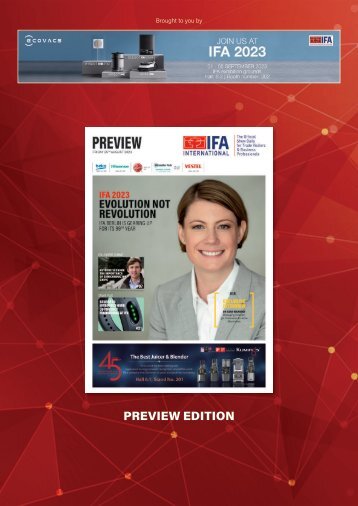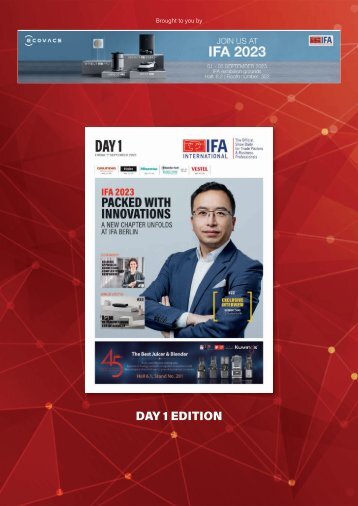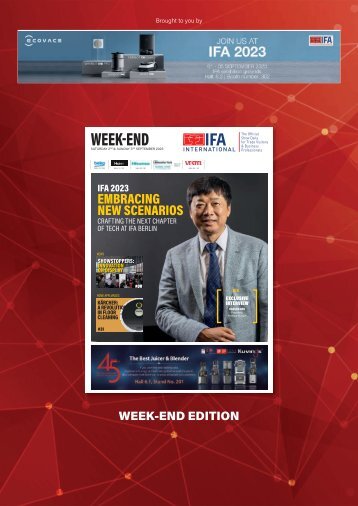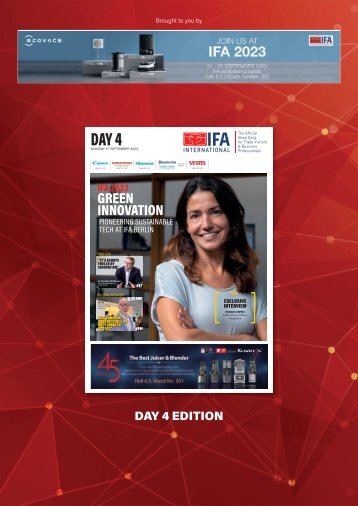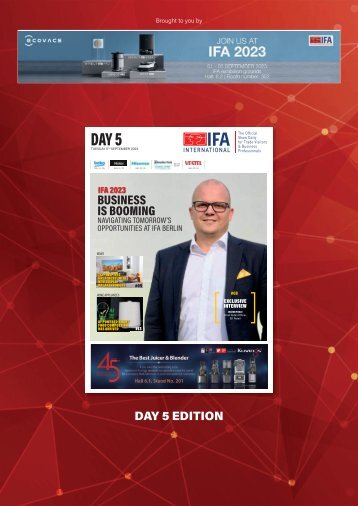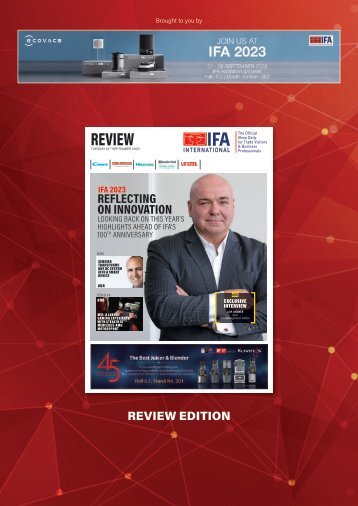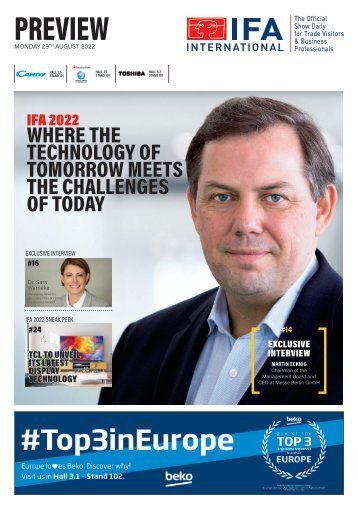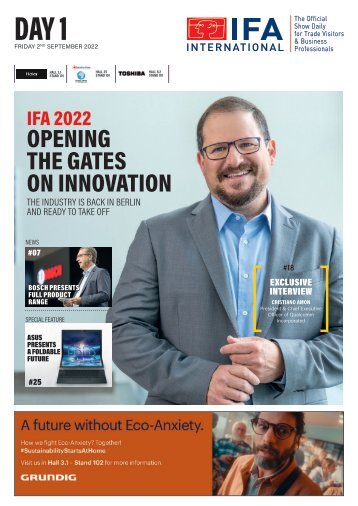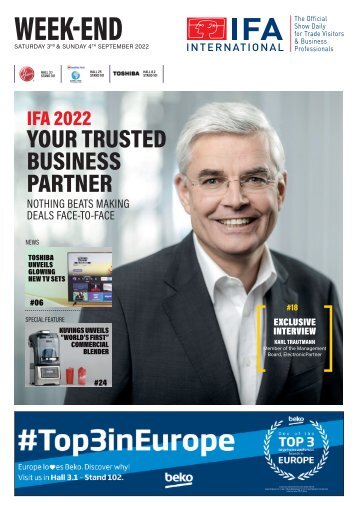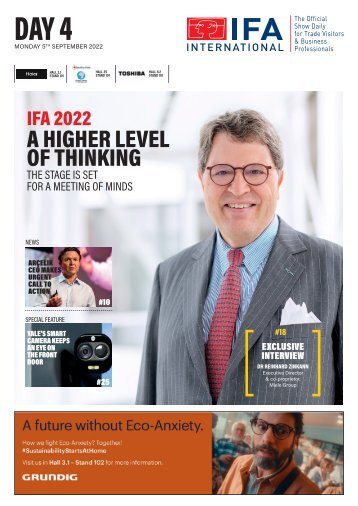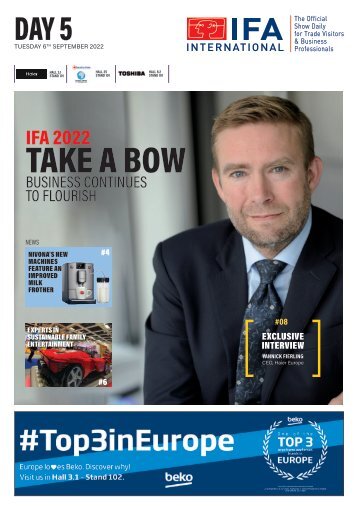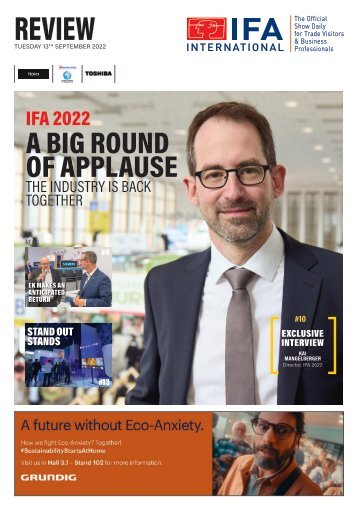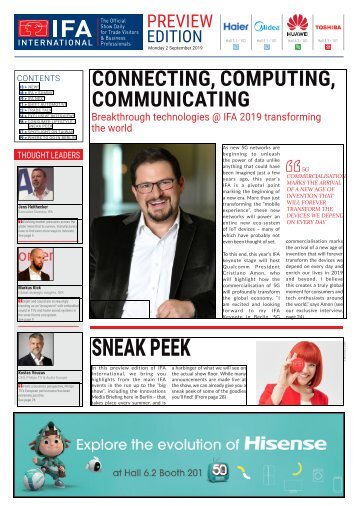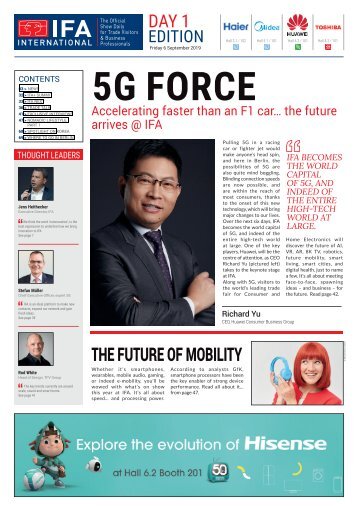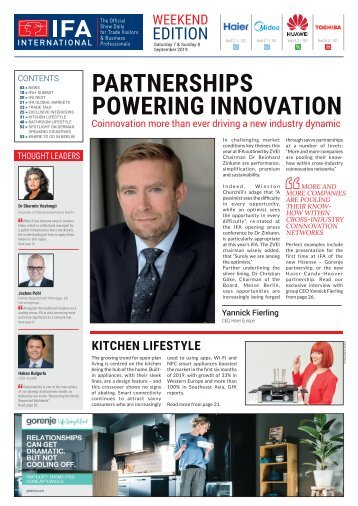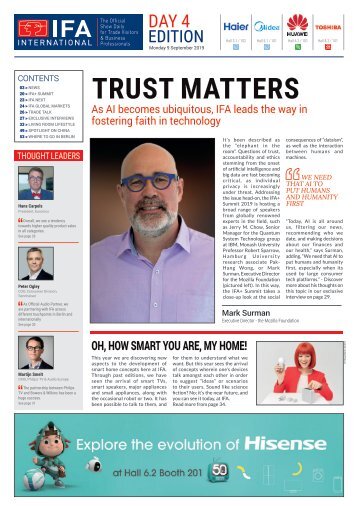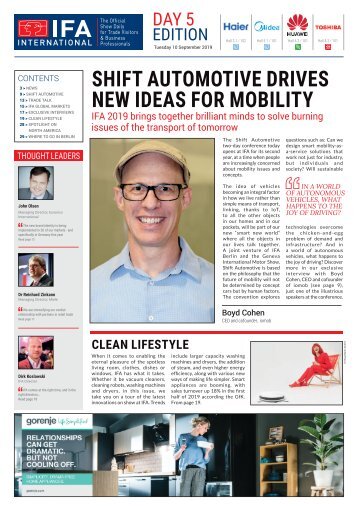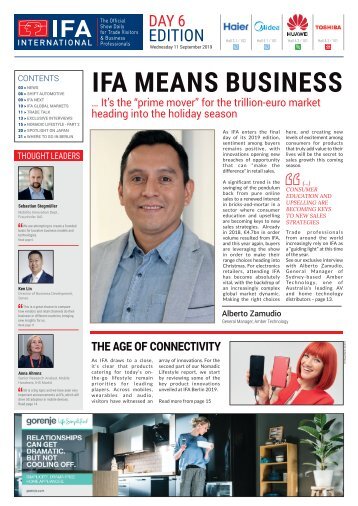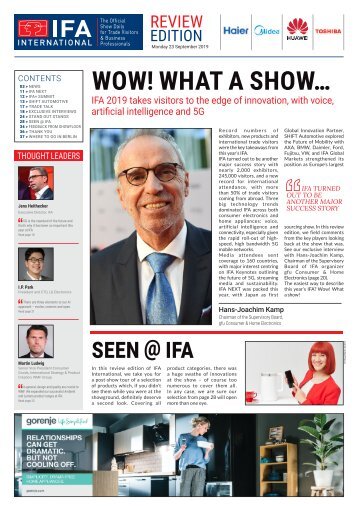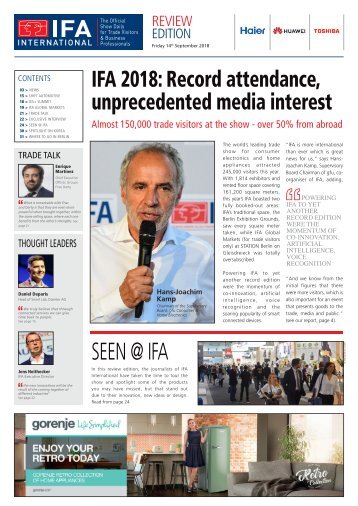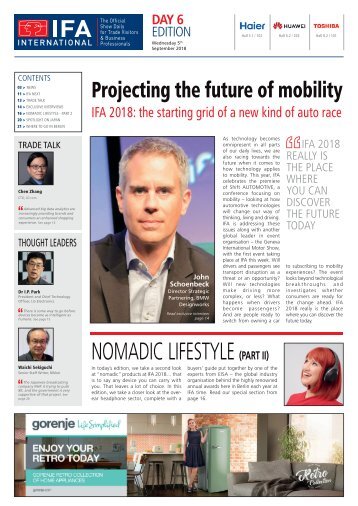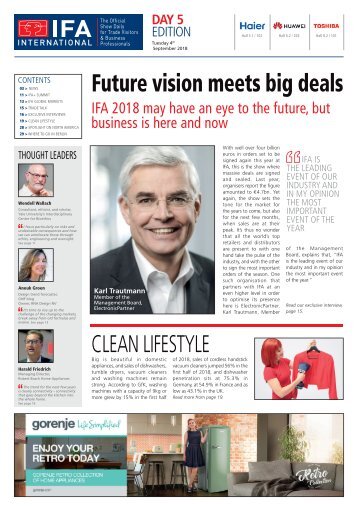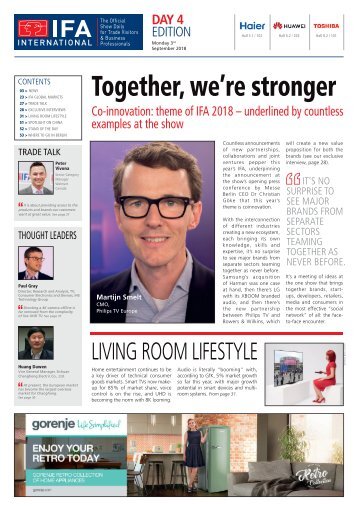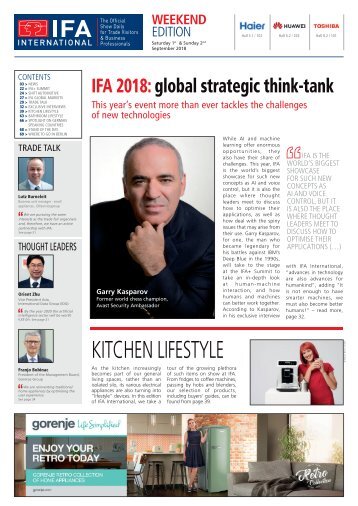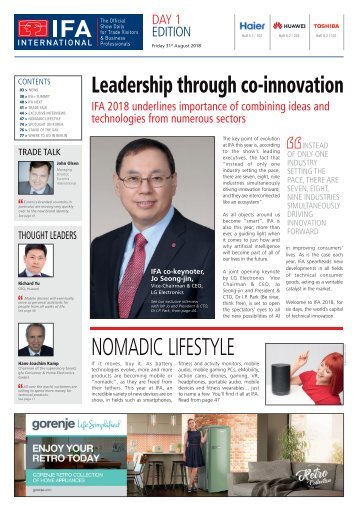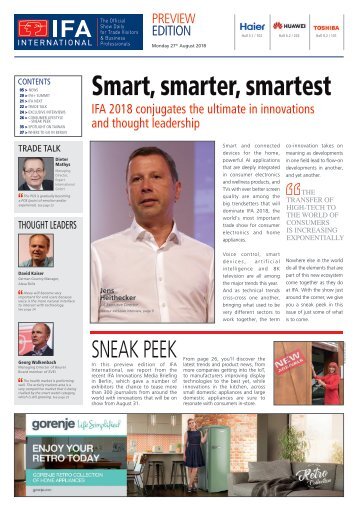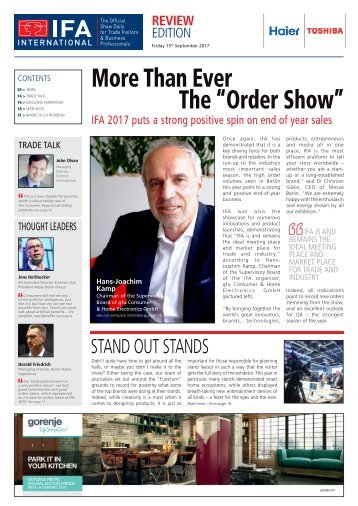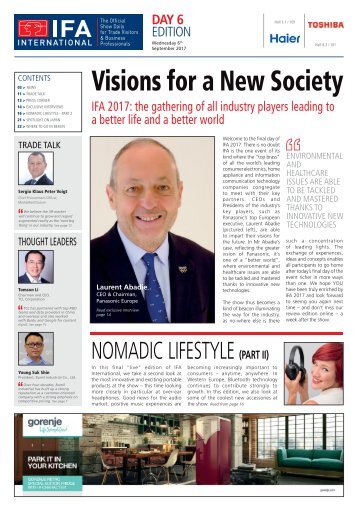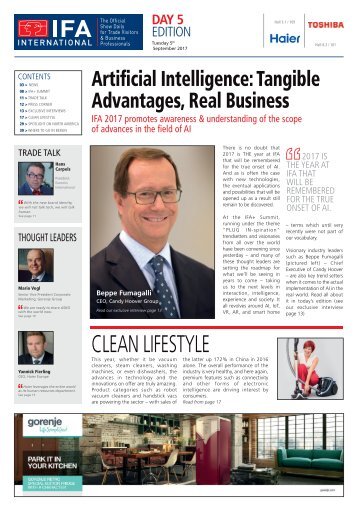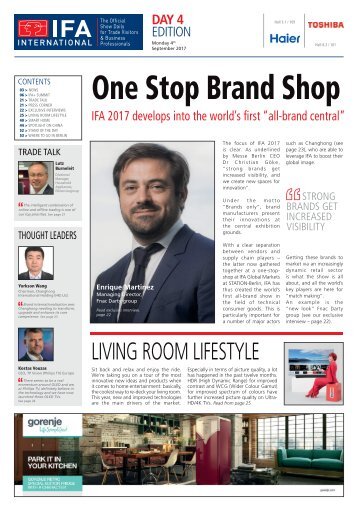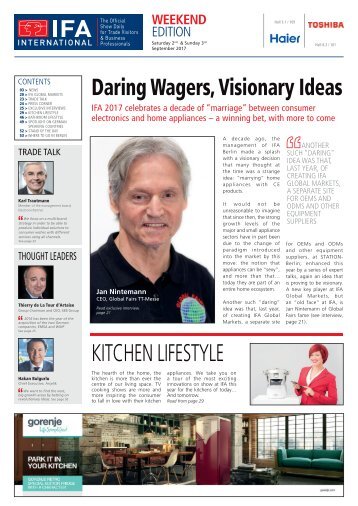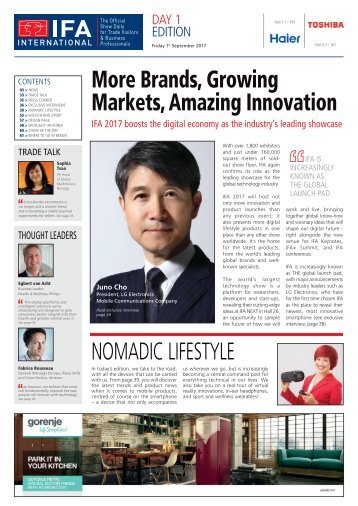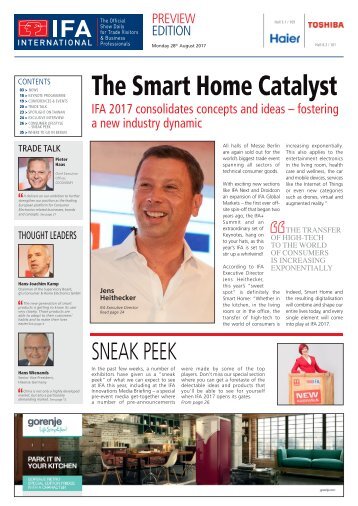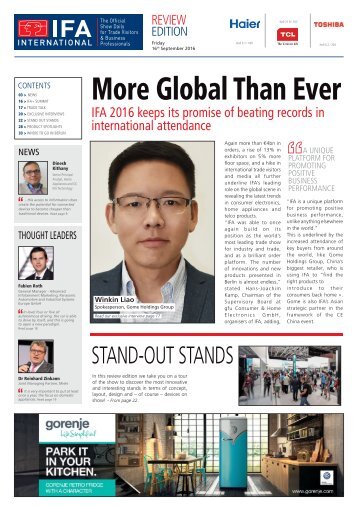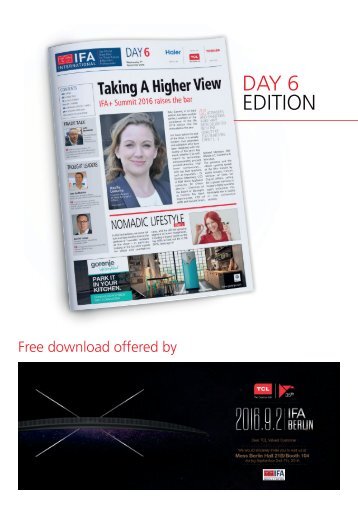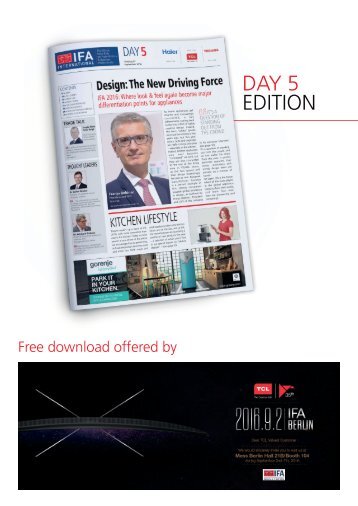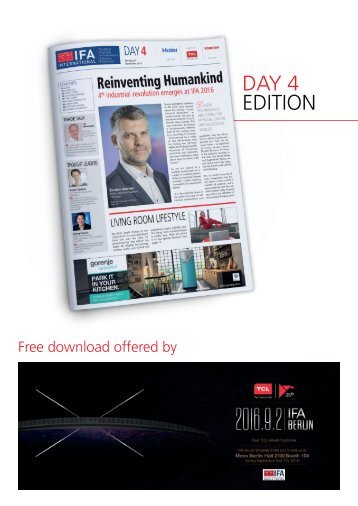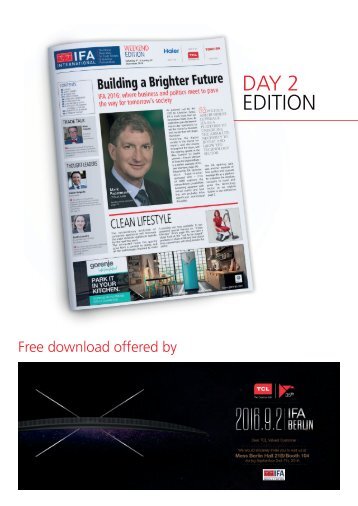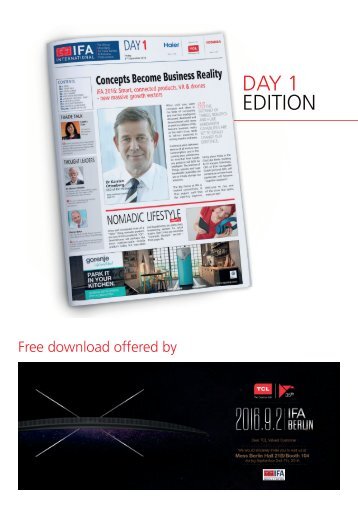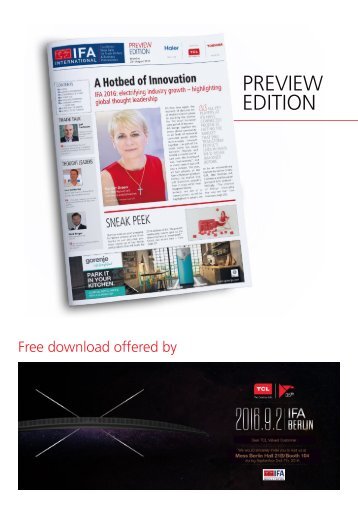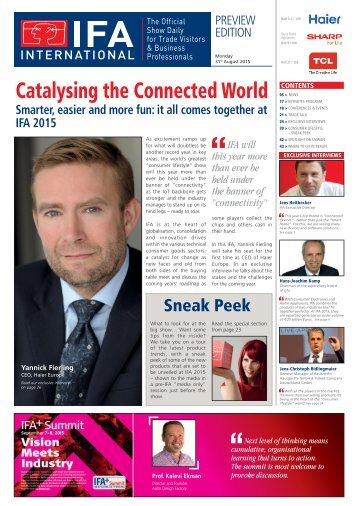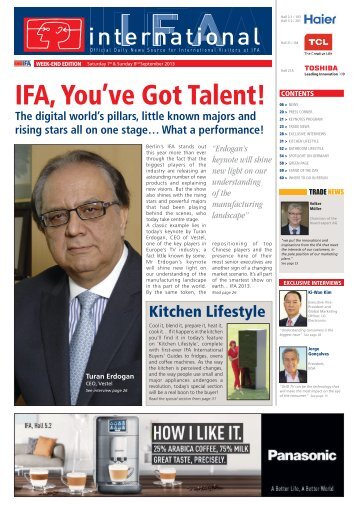
Day 5 - IFA International
- Text
- Products
- Berlin
- Oled
- Consumer
- Consumers
- September
- European
- Technologies
- Digital
- Content
- Www.cleverdis.com
Exclusive Interview
Exclusive Interview Bringing out the best in televisions Philips continues to push boundaries in screen and green technology “The TV will become your smartphone in the living room” Philips is one of the largest and most powerful players in the European TV market. But the Dutch heritage brand is not entirely focused on being the biggest, Robert Smits, Philips’ General Manager of Television and Executive Vice President of Consumer Lifestyle, tells IFA International: “We just want to continue to be the best…” Differentiation is at the heart of our strategy. We want to be more than a black box in the living room. We want you to be part of the onscreen action. That’s why we focus on creating a cinematic viewing experience in the home. Giving consumers that sense that they are in that movie or at that football game is all about light, picture, sound and interaction. We developed Ambilight because it draws you into the on-screen action, which is exactly what consumers want. We’ve sold over six million Ambilight TVs worldwide since we introduced the concept in 2004. And what’s more, once consumers have experienced Ambilight, they never go back. Over 70% of our customers have told us that they would buy an Ambilight television again. In terms of picture quality, we continue to lead innovations with technologies such as Perfect Pixel HD, Natural Motion, and LED Pro. This offers the clearest and most true-to-life picture, no matter what the source — Blu-ray, SD or YouTube. And with the arrival of Full-HD 3D, we will continue to lead the way in this area. How do you see the TV evolving? The most powerful trend, in my view, is the fact that TVs are becoming Internet enabled. This will significantly change — indeed, is already changing — the role of TV in the home. TVs will become a central hub, Robert Smits, Philips’ General Manager of Television and Executive Vice President of Consumer Lifestyle allowing you to watch what you want when you want, access information, share experiences, connect with vfriends, purchase goods… Essentially, the TV will become your smartphone in the living room. With Philips Net TV, we are at the forefront of this trend, which is changing the way consumers connect with content. Electronic distribution offers convenience and simplicity, and advances in technology, broadband penetration and wifi are making Internet-on- TV a serious alternative. But we believe that electronic distribution will co-exist with physical distribution and broadcast TV for many years to come, because that’s what consumers want. We believe people will always want to watch live events, such as the football, on their TVs. What will be needed for 3D to become a success? The technology is there and the number of 3D titles is growing, driven by the success of blockbuster hits such as Avatar and the World Cup. But ultimately, consumers will determine the success of 3D. It will only succeed if it addresses the needs of consumers. What are Philips’ biggest challenges in the TV market? Our TV business has gone through some significant changes in recent years. We have optimised our industrial footprint; targeted our innovation and development activities on delivering differentiation; and optimised the way in which we serve consumers by establishing, for instance, brand-licensing agreements in markets such as India and China. As a result, we have become a leaner, meaner organisation focused on efficiency, speed, our target markets, and giving our retail partners and consumers what they really want. And it’s working. Our business is returning to the black and I’m confident that we have the strategy, products, team and brand strength in place to reach new levels. How does your division fit in with Philips’ Sustainability project? Philips TVs are designed to have a minimum impact on the environment. We have maximised the efficiency of our manufacturing processes, and invested in low-energy technologies, such as LED screens, to improve the energyefficiency of the products themselves. We have also replaced paper manuals with an easy-to-use on-screen user manual, which saves approximately 25,000 trees each year. Right now, we are designing TVs with smaller stands to reduce our use of plastics by up to 30%. At Philips, sustainability is in our DNA. That’s why we are taking a lifecycle approach to making our TVs more sustainable. We are reducing energy consumption, materials and hazardous substances while improving recyclability. This year, we are introducing Europe’s greenest TV at IFA — the Econova LED TV — which reduces energy consumption by 60%, is partly made from recycled aluminum and consumes zero Watts of power. Econova is also designed for easy recycling and has a solar-powered remote control. We’re very proud that EISA has recognised it as this year’s greenest television. 14
Market & Technology Trends All the right proportions Philips redefines the ultimate home-viewing experience Last year, Philips generated headlines with its Cinema 21:9 TV, which was one of the biggest launches of IFA 2009. The Dutch power player is now hoping to replicate that success with its Full-HD 3D Cinema 21:9 Platinum series, billed as the world’s first cinema-proportioned 3D TV. John Olsen, Vice-President of Marketing Television at Philips Consumer Lifestyle, tells IFA International more… Philips Consumer Lifestyle’s John Olsen: more Cinema 21:9 concepts to come The fact that we are launching a new Cinema 21:9 TV this year is testament to the popularity of the concept. The Full HD 3D Cinema 21:9 Platinum series gives consumers the ultimate cinematic viewing experience in the home. It boasts a 58-inch screen that is shaped in the 21:9 aspect ratio, so movies in the 2.39:1 format completely fill the screen. Traditional LCD televisions compromise on quality by distorting the “IFA is so important to us that our product launch windows are completely aligned with the event” 3D: part of a futuristic stand by Philps picture to fill the screen, losing the full scope of the original shot — or they display the picture in letterbox format, with black bars at the top and bottom. Complemented with threesided Ambilight Spectra, the Cinema 21:9 Platinum series completely immerses you in the on-screen action. It is also the world’s first cinemaproportioned TV to include multi-view, so you can keep up to date through net TV while you are watching it. While I don’t want to disclose too much about our future plans, we will see the introduction of other Cinema 21:9 concepts in the future. What else are your launching at IFA 2010? We are also introducing the world’s first LED TV that can be designed and ordered online to suit your personal taste and interior. Consumers can customise the colour of the TV frame, pick their preferred screen size, chose a stand or wall mount, and select the accompanying remote control. What kind of TV marketing campaigns can we expect from Philips? We will continue to build our position as the brand that delivers the ultimate cinematic experience at home For us, it’s not about screaming technologyspeak at consumers, but about being relevant. So in recent years, we have been building up our credibility in the film space, culminating this year in a co-operation with Ridley Scott Associates [RSA], with whom we have created six short films and launched them online. The sixth film, which we are prescreening at IFA, has been produced completely in Full- HD 3D and is directed by RSA’s Barney Cokeliss. The new 3D film continues our Parallel Lines campaign and will promote our cinematic range of 3D LED TVs. It will be supported by an in-store retail experience in the third and fourth quarters, and a 2D version of the film will also be presented on www.philips.com/cinema and www.youtube.com/ philipscinema. Exclusive footage of how the film was made, including interviews with the director and crew, has been released on Philips Cinema’s Facebook page. On September 21, we will also announce the winner of our global film-making competition, which is being judged by the legendary Sir Ridley Scott. Called Tell It Your Way, the film gives aspiring film-makers the chance to have an original work viewed by a top Hollywood director. The top prize is a week’s work experience at the offices of RSA. Despite the challenge of producing a short in just 12 weeks, over 600 entries were received, of which 306 made it into the first selection round. Ten finalists were then selected by a panel comprising representatives from RSA, British academy of film and television and Philips. Since August, members of the public have been voting for their favourite film by clicking the YouTube ‘thumbs up’ or ‘thumbs down’ icons. The five films with the highest votes at midnight, September 5 qualified for the final round of judging, when Ridley Scott will select an overall winner. How important is IFA within your marketing strategy? IFA is very important to us for a number of reasons. First, it provides us with an important forum for us to meet with our key retailers and discuss our plans for the future. Second, it provides us with an opportunity to connect with consumers and hear first-hand what they want, need and think of our products, which is incredibly valuable. And finally, IFA provides us with the launch pad for our innovations. In fact, IFA is so important to us that our product launch windows are completely aligned with the event. I wish IFA a happy 50th birthday and hope that it will continue on its path for another 50 years. www.ifa-international.org IFA International • Tuesday, 7 th September 2010 15
- Page 1 and 2: DAY 5 TUESDAY, 7 TH SEpTEmbEr 2010
- Page 3 and 4: Jarre realises his vision of the fu
- Page 5: News Where the future happens first
- Page 9: Market & Technology News Major Dome
- Page 12 and 13: Exclusive Interview Showing is beli
- Page 16 and 17: We give buyers the kinds of multi-m
- Page 19 and 20: Exclusive Interview Simply does it
- Page 21 and 22: Special Feature New TV Technologies
- Page 23 and 24: HALL PLAN www.ifa-international.org
- Page 25: Hall 22 - Stand 101 Hall 5.2 - Stan
- Page 28 and 29: Special Feature Sound Pix B&W’s c
- Page 31 and 32: Special Feature Sound Pix The livin
- Page 33 and 34: Exclusive Interview When B2B meets
- Page 35 and 36: Special Feature Dishwashers Ever gr
- Page 37 and 38: Exclusive Interview Dochul Choi, Se
- Page 39: Hans-Joachim Kamp n Vice President
- Page 43 and 44: THE DIARY OF MISS IFA Out and about
- Page 45 and 46: WHERE TO GOIN BERLIN International
Inappropriate
Loading...
Mail this publication
Loading...
Embed
Loading...

IFA International
- IFA International 2023
- IFA International 2022
- IFA International 2020
- IFA International 2019
- IFA International 2018
- IFA International 2017
- IFA International 2016
- IFA International 2015
- IFA International 2014
- IFA International 2013
- IFA International 2012
- IFA International 2011
- IFA International 2010
- IFA International 2009
- IFA International 2008
- IFA International 2007
